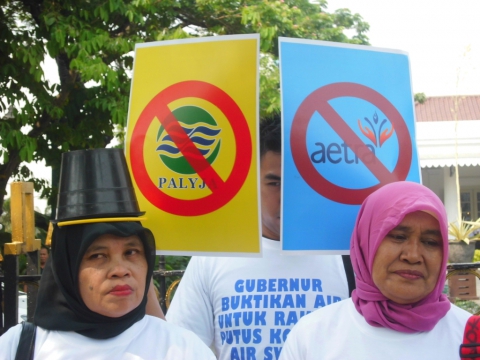The Central Jakarta District Court on 24 March annulled the water privatisation contracts of Suez (PT PAM Lyonnaise Jaya – Palyja) and Aetra, finding that the Public-Private Partnerships (PPP) were negligent in fulfilling the human right to water for Jakarta's residents.
Click here to read this on the PSI website
 The court decision is the culmination of many years of resistance by a broad coalition of Jakarta residents, trade unions, and other water justice activists. [1] They were upset not only with the initial, corrupt, behind-the-scenes decision (made under the Suharto regime in 1997) to privatize water supply; they opposed the continuous manipulations of the private operators to increase their profits without improving water services. Water services coverage is lower than promised and water leakage levels are high (44%); water tariffs grew fourfold since privatisation (Rp1.700/m3 to Rp7,020/m3), which is 2.7 times higher than the public operator in Surabaya, Indonesia's second largest city. [2]
The court decision is the culmination of many years of resistance by a broad coalition of Jakarta residents, trade unions, and other water justice activists. [1] They were upset not only with the initial, corrupt, behind-the-scenes decision (made under the Suharto regime in 1997) to privatize water supply; they opposed the continuous manipulations of the private operators to increase their profits without improving water services. Water services coverage is lower than promised and water leakage levels are high (44%); water tariffs grew fourfold since privatisation (Rp1.700/m3 to Rp7,020/m3), which is 2.7 times higher than the public operator in Surabaya, Indonesia's second largest city. [2]
Rosa Pavanelli, General Secretary of the global trade union federation Public Services International says:
"Yesterday's decision is a success for the Jakarta citizens and workers, but also for the global water movement. It is further proof of the misguided and myopic World Bank and Asian Development Bank privatization strategies, which are not only unwelcome, but are illegal. We call on the World Bank and the ADB to immediately cease-and-desist all of their privatization initiatives in the water and sanitation sector, including in Nagpur and Mysore in India, and in Lagos, Nigeria." [3]
The Central Jakarta District Court decision is coherent with the Indonesian Constitutional Court ruling of 20 February 2015, which annulled Law No. 7/2004 on Water Resources passed by the Indonesian government, again under pressure from the World Bank. The ruling was made on the grounds that water resources have to be controlled and allocated for the public benefit, thus private companies cannot monopolize rights over water sources. [4]
Nila Ardhianie, Director of Amrta Institute for Water Literacy in Indonesia said
"We applaud these two verdicts. For Jakarta, it is now up to the Governor. Together, we can build a strong public utility for all Jakartans. We can also get help from strong public utilities, both in Indonesia and from overseas, but without the distortions of profit maximization."
Jakarta joins major cities in remunicipalising their water services: Paris, Berlin, Budapest, Buenos Aires, Accra, Dar es Salaam, Kuala Lumpur. [5] Most of these remunicipalisations are not ideological, but are because privatisation failed to deliver investment, led to poor services, and unsustainable water rates. Public water services are better able to integrate social and environmental needs that are critical to planning water sustainably in the future.
Fiona Dove, Executive Director of the Transnational Institute said:
"The citizen's victory in Jakarta will give an enormous boost to the growing global trend of cities overturning failed privatizations and taking back control of critical water services. This will empower many more local governments to close the book on privatization, which has proven socially and economically unsustainable across the world." [6]
These two important court rulings in Indonesia provide momentum for crucial discussions about the right to water and alternatives to water privatisation, only weeks before governments and other water sector decision-makers will gather at the corporate-controlled World Water Forum in South Korea (12-17 April).
Notes: [for the full set of notes click here]
Click here to read this on the PSI website
ASU response
"The ASU is not surprised by the decision in Jakarta as it bears out what we have been warning about privatisation for many years," said ASU Assistant National Secretary Greg McLean.
"When essential services like water and electricity are privatised, the community's basic rights to these services are at risk – this decision in Indonesia highlights concerns the ASU has raised for decades and our position that sale of these public assets must not proceed."
"Equitable distribution, quality of service, affordability, all these aspects come under pressure when private operators seek to make profits from services."
"Countless examples of privatisation failures are now justifiably causing Australians to question the policy as we realise that communities are losing the things they value and gaining none of the touted benefits," said Greg McLean.
The ASU released a report yesterday, "The Privatisation Betrayal: losing the things we value", which brings together research from around the world to support the position that privatisation does not benefit our communities.

